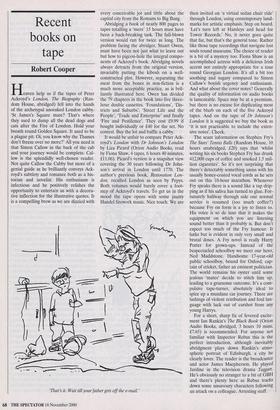Recent books on tape
Robert Cooper
Heaven help us if the tapes of Peter Ackroyd's London, The Biography (Ran- dom House, abridged) fell into the hands of the archetypal anoraked London cabby. `St James's Square mate? That's where they used to dump all the dead dogs and cats after the Fire of London. Hold your breath round Golden Square. It used to be a plague pit. 0i, you know why the Thames don't freeze over no more?' All you need is that Simon Callow in the back of the cab and your journey would be complete. Cal- low is the splendidly well-chosen reader. Not quite Callow the Cabby but more of a genial guide as he brilliantly conveys Ack- royd's subtlety and romance both as a his- torian and novelist. His enthusiasm is infectious and he positively relishes the opportunity to entertain us with a decora- tive inflection for the illustrative quotes. It is a compelling brew as we are dizzied with every conceivable jot and tittle about the capital city from the Romans to Big Bang.
Abridging a book of nearly 800 pages to tapes totalling a 'mere' 15 hours must have been a back-breaking task. The full-blown version would run for twice as long. The problem facing the abridger, Stuart Owen, must have been not just what to leave out but how to pigeon-hole the integral compo- nents of Ackroyd's book. Abridging novels always detracts from the original version, invariably putting the kibosh on a well- constructed plot. However, separating the meat from the bones in non-fiction is a much more acceptable practice, as is bril- liantly illustrated here. Owen has divided the 79 chapters in the book into five three- hour double cassettes. 'Foundations', 'Dis- tricts and Suburbs', 'Street Life and the People', 'Trade and Enterprise' and finally `Fire and Pestilence'. They cost £9.99 if bought individually or £40 for the set. No contest. Buy the lot and baffle a cabby.
It would be unfair to compare Peter Ack- royd's London with Dr Johnson's London by Liza Picard (Orion Audio Books, read by Fiona Shaw, 4 tapes, 6 hours 40 minutes, £11.06). Picard's version is a snapshot view covering the 30 years following Dr John- son's arrival in London until 1770. The author's previous book, Restoration Lon- don, recalled London as seen by Pepys. Both volumes would barely cover a foot- step of Ackroyd's travels. To get us in the mood the tape opens with some jaunty Handel firework music. Nice touch. We are `That's it. Wait till your father gets off the e-mail.' then invited on 'a virtual sedan chair ride' through London, using contemporary land- marks for artistic emphasis. Step on board. `Let's turn left at Hamleys and head for Tower Records.' No, it never goes quite that far, but that's the general tone. Rather like those tape recordings that navigate lost souls round museums. The choice of reader is a bit of a mystery too. Fiona Shaw is an accomplished actress with a delicious Irish accent not entirely appropriate for a tour round Georgian London. It's all a bit too soothing and sugary compared to Simon Callow's boyish urgency and enthusiasm. And what about the cover notes? Generally the quality of information on audio books is lamentable. Space may be at a premium, but there is no excuse for duplicating most of the blurb on each of the five Ackroyd tapes. And on the tape of Dr Johnson's London it is suggested we buy the book as `it is not practicable to include the exten- sive notes'. Cheek.
The scant information on Stephen Fry's The Stars' Tennis Balls (Random House, 10 hours unabridged, £20) says that 'whilst writing his six books Stephen Fry has drunk 412,000 cups of coffee and smoked 1.5 mil- lion cigarettes'. So it's not surprising that there's detectably something amiss with his usually honey-coated vocal cords as he sets out on this 10-hour marathon. Whenever Fry speaks there is a sound like a tap drip- ping as if his saliva has turned to glue. For- tunately halfway through side one normal service is resumed (too much coffee?) because Fry on form is a joy to listen to. His voice is so de luxe that it makes the equipment on which you are listening sound better than it probably is. But don't expect too much of the Fry humour. It lurks but is evident in only very small and brutal doses. A Fry novel is really Harry Potter for grown-ups. Instead of the bespectacled schoolboy we meet our hero, Ned Maddstone. Handsome 17-year-old public schoolboy, bound for Oxford, cap- tain of cricket, father an eminent politician. The world remains his oyster until some jealous 'mates' decide to stitch him up, leading to a gruesome outcome. It's a com- pulsive tape-turner, absolutely ideal to spice up a mundane car journey. There are lashings of violent retribution and foul lan- guage with luck out of earshot from any young Harrys.
For a short, sharp fix of fevered excite- ment Ian Rankin's The Black Book (Orion Audio Books, abridged, 3 hours 10 mins, £7.65) is recommended. For anyone not familiar with Inspector Rebus this is the perfect introduction, although inevitably abridgment plays down Rankin's atmo- spheric portrait of Edinburgh, a city he clearly loves. The reader is the broadcaster and actor James Macpherson. He played Jardine in the television drama Taggart. He's obviously no stranger to a bit of GBH and there's plenty here as Rebus tracks down some unsavoury characters following an attack on a colleague. Arresting stuff.


































































































 Previous page
Previous page